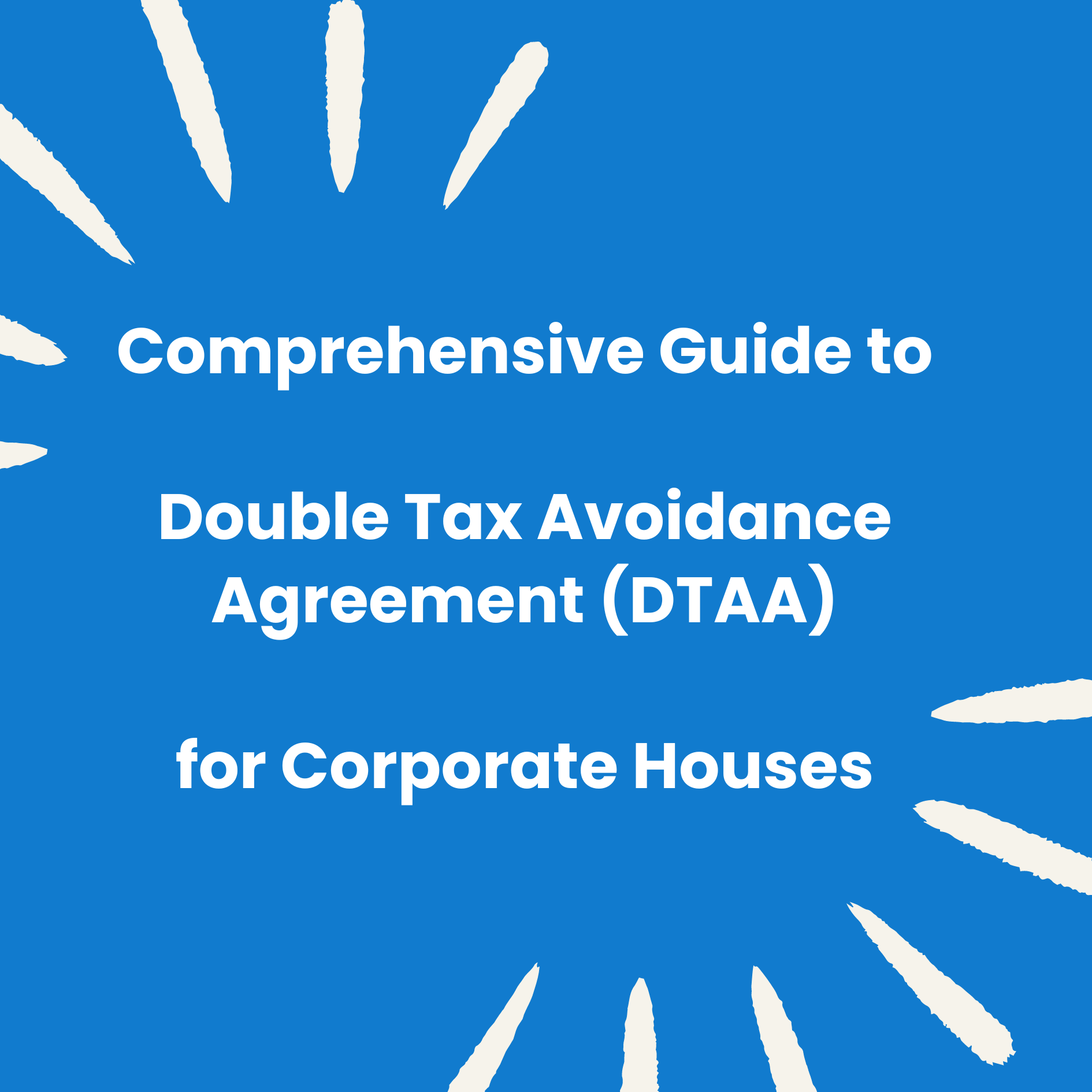Double Tax Avoidance Agreement (DTAA) for Corporate Houses
April 14, 2024

In today's globalized economy, corporate houses and multinational companies are expanding their operations across borders to tap into new markets and opportunities. However, with cross-border transactions come complex tax implications, including the risk of double taxation. To address this challenge, businesses often rely on Double Taxation Avoidance Agreements (DTAA) between countries. In this guide, we'll delve into the intricacies of DTAA and explore its significance for corporate houses in the current business landscape.
Simply what is DOUBLE TAX AVOIDANCE AGREEMENT (DTAA) ??
DTAA, also known as tax treaties, are bilateral agreements between two countries aimed at eliminating or reducing double taxation of income earned by residents of the contracting states. These agreements define the rules for taxing various types of income, including business profits, dividends, interest, and royalties, in each country
Current Scenarios and Trends:
In recent years, corporate houses have been increasingly leveraging DTAA to optimize their tax positions and mitigate the risk of double taxation.
Some key trends include:
Strategic Tax Planning:
Businesses are strategically structuring their operations and transactions to take advantage of favorable provisions in DTAA, such as reduced withholding tax rates on dividends, interest, and royalties.
Expansion into Emerging Markets:
With the rise of emerging markets, corporate houses are expanding their presence globally. DTAA plays a crucial role in facilitating cross-border investments and ensuring tax efficiency in diverse jurisdictions.
Compliance and Risk Management:
Given the heightened scrutiny of international tax practices by regulatory authorities, corporate houses are prioritizing compliance with DTAA provisions to mitigate the risk of tax disputes and penalties.
Key considerations under DTAA include determining the tax residency status of the business, identifying any permanent establishment (PE) in foreign countries, and assessing the available treaty benefits such as reduced withholding tax rates and exemptions. It's crucial for businesses to understand the tie-breaker rules (TBR) for tax residency, as well as the implications of having a PE abroad, as these factors can impact the application of DTAA provisions. Additionally, businesses should carefully evaluate the eligibility criteria for treaty benefits and ensure compliance with the necessary conditions to qualify for reduced tax rates or exemptions under the treaty.
1. Tax Residency:
Determining the tax residency status of a business involves identifying the jurisdiction in which the business is considered a resident for tax purposes. Tax residency typically depends on factors such as the place of incorporation, central management and control, and the location of key decision-making personnel. Understanding the tie-breaker rules (TBR) outlined in the DTAA is essential for resolving conflicts that may arise when a business could be considered a resident of more than one country under their respective domestic laws. These tie-breaker rules typically consider factors such as the place of effective management, the location of head office, and the place where the senior management regularly meets. By determining tax residency accurately, businesses can ensure compliance with the tax laws of the relevant jurisdictions and avoid potential disputes with tax authorities.
2. Permanent Establishment (PE):
Identifying whether a business has a permanent establishment (PE) in a foreign country is crucial, as the presence of a PE can trigger taxation in that country under the DTAA. A permanent establishment generally refers to a fixed place of business through which the business carries out its activities, such as an office, branch, factory, or construction site. The definition of PE may vary between different tax treaties, but common criteria include the presence of a physical location, the duration of business activities, and the level of authority exercised by the business at that location. It's essential for businesses engaged in cross-border activities to carefully assess their operations in foreign jurisdictions to determine whether they have a PE and to understand the tax implications associated with it under the applicable tax treaty.
3. Treaty Benefits:
Assessing the available treaty benefits under the DTAA is crucial for optimizing a business's tax position and minimizing tax liabilities on cross-border transactions. These benefits may include reduced withholding tax rates on dividends, interest, and royalties, as well as exemptions for certain types of income. However, to qualify for these treaty benefits, businesses must fulfill the necessary conditions outlined in the tax treaty. These conditions may include requirements related to the ownership structure, the nature of the income, and the residency status of the recipient. It's essential for businesses to carefully review the provisions of the DTAA and ensure compliance with the eligibility criteria to avail themselves of the benefits provided by the treaty. By leveraging treaty benefits effectively, businesses can enhance their tax efficiency, reduce tax costs, and facilitate cross-border trade and investment activities.
Now need to know bit more at the side of Importance in Current Scenarios and Factors to Consider under DTAA by the Business Houses, lets see more:
DTAA plays a critical role in facilitating cross-border trade and investment by providing certainty and clarity on tax obligations. In the current business landscape, the importance of DTAA cannot be overstated, especially considering a businesses expand globally, DTAA provides a framework for resolving tax disputes and promoting cooperation between countries. DTAA enables businesses to structure their international operations in a tax-efficient manner, thereby minimizing their overall tax liabilities. Additionally, Compliance with DTAA provisions is essential for mitigating the risk of double taxation and avoiding tax disputes with regulatory authorities.
We all knew that DTAA has several benefits but at the same time it own some that needs to be considered
- DTAA provisions can be complex and subject to interpretation, leading to uncertainty and potential disputes between tax authorities.
- Some businesses may engage in aggressive tax planning strategies, such as treaty shopping, to exploit loopholes in DTAA and minimize their tax liabilities.
- Ensuring compliance with DTAA provisions requires careful documentation and adherence to procedural requirements, which can be burdensome for businesses operating in multiple jurisdictions.
So what are the general steps can be followed by Business Houses to get more details about DTAA to navigate effectively? lets go through it generalized steps that can be followed by business houses.
Business houses can have detailed conduct a Comprehensive Tax Review i.e. assess the business's tax positions and exposure to double taxation in relevant jurisdictions.
Next business houses can seek professional advice from a relative consultant i.e. Consult with tax advisors or legal experts with expertise in international taxation and DTAA.
Next Business houses can review existing contracts and agreements and evaluate existing contracts and agreements to identify potential tax implications under DTAA.
Not but least get stay Informed i.e. business houses need to stay abreast of developments in international tax laws and DTAA provisions that may impact the business's operations.
Let's not write more and go to a conclusion, DTAA serves as a vital tool for corporate houses and multinational companies to navigate the complexities of international taxation and mitigate the risk of double taxation. By understanding the provisions of DTAA and adhering to compliance requirements, businesses can optimize their tax positions and ensure seamless cross-border operations.
As experts in international taxation, we recommend that corporate houses prioritize proactive tax planning and compliance with DTAA provisions to maximize tax efficiency and minimize the risk of tax disputes. Additionally, businesses should seek professional advice and stay informed about changes in DTAA regulations to adapt to evolving tax landscapes.
Disclaimer:
The information provided in this guide is for educational purposes only and should not be construed as legal or tax advice. Businesses should seek professional guidance from qualified tax advisors or legal experts regarding their specific tax situations and obligations.
Author Detail
Manik Balami
Corporate Financial, Legal and Tax Professional
Academical Tax Subject Trainer for Bachelor and Master in Nepal
To reach: manik.balami@rudolphservice.com
Other Blogs





